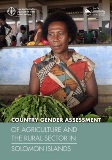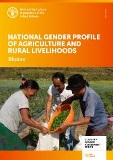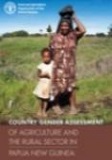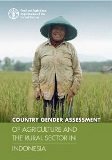Publications

Solomon Islands: Country Gender Assessment of agriculture and the rural sector (Country Gender Assessment Series)
13/11/2019
This country gender assessment of the agricultural and rural sectors of the Solomon Islands provides a situational analysis of rural women’s experiences and considers social norms, gender power dynamics and how rural women and men access, control and use natural resources for their livelihoods. It also provides an assessment of the enabling environment for gender mainstreaming by government agencies by examining five key criteria impacting mainstreaming work. 50 pp.

Samoa: Country Gender Assessment of agriculture and the rural sector (Country Gender Assessment Series)
13/11/2019
This Assessment analyses the agriculture and rural sectors from a gender perspective at the macro level (policy), meso level (institutional) and micro level (community and household). The assessment seeks to identify gender inequalities in access to critical productive resources, assets, services and opportunities. It also looks at the priorities, needs and constraints of both women and men in agricultural and rural communities, and the gaps that exist in responding to these issues. 50 pp.

Gender in adaptation planning for the agriculture sectors Guide for Trainers
01/11/2019
Based on the gender activities carried out, the NAP-Ag programme has developed a training guide on mainstreaming gender to support countries in their adaptation planning processes. This guide provides a complete set of materials to be used in training workshops on mainstreaming gender in adaptation planning in the agriculture sector, and is a valuable resource to turn gender goals into concrete action. 188 pp.

Nepal: Country gender assessment of agriculture and the rural sector (Country Gender Assessment Series)
19/10/2019
This assessment examines the existing gender relations and inequalities in various agricultural subsectors, their causes, and their impacts on the social and economic development of agriculture and the rural economy. It provides an analysis of crucial policies, strategies, plans and programmes. It also highlights key elements for the promotion of gender equality in agriculture and rural development, and for strengthening rural women’s social and economic empowerment. 80 pp.

Papua New Guinea: Country Gender Assessment of agriculture and the rural sector (Country Gender Assessment Series)
17/10/2019
This assessment provides recommendations for future programming and projects for promoting gender equality and women’s empowerment are included, along with possible partners for gender-related activities in Papua New Guinea and will become a tool for FAO Papua New Guinea, the Government of Papua New Guinea and other development partners to mainstream gender into their future programmes and projects towards gender equality and the empowerment of rural women in Papua New Guinea. 66 pp.

Maldives: Country gender assessment of agriculture and the rural sector (Country Gender Assessment Series)
16/10/2019
This assessment provides evidence of gender inequalities in the agriculture and rural sectors of Maldives, highlighting rural women’s needs, challenges and priorities. It also analyses country-level achievements, and shortfalls in closing existing gaps towards the pursuit of gender equality. It also provides data on facilitating women’s empowerment and their access to resources and opportunities. 46 pp.

Rural Women’s Economic Empowerment Facility
06/10/2019
Gender-based socioeconomic inequalities are preventing rural women from sustaining and improving their livelihoods. Gender disparities in food security are due to unequal access to resources, services and economic opportunities. Studies show that ensuring women’s equitable access to economic resources and opportunities boosts productivity, bolstering prosperity, food security and economic growth. 2 pp.

Indonesia: Country Gender Assessment of agriculture and the rural sector (Country Gender Assessment Series)
01/09/2019
This assessment analyzes the agricultural and rural sector of Indonesia from a gender perspective at the macro (policy), meso (institutional) and micro (community and household) levels in order to identify gender inequalities in access to critical productive resources, assets, services and opportunities. It identifies the needs and constraints of both women and men in selected FAO areas of competence, as well as identifying priorities and gaps. 67 pp.
